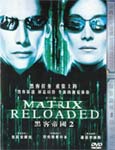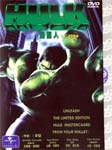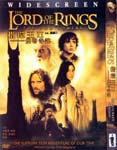


It's hard to resist a bargain. Who wouldn't be interested in a copy of the
latest DVD (or even cinema) movie at a fraction of its usual cost? With multi-disc
releases like the Two Towers now topping £30 for a single film, even those with
deep pockets might be tempted to risk a few quid on a 'promo' copy at a car boot
sale. But don't fool yourself. These bargains are almost always pirate copies,
churned out in the tens of thousands by Far East factories and smuggled into Britain
by criminal gangs.
As the format explodes into the mass market, the market for counterfeit DVDs grows
apace. By the end of 2003, over 1.5 million pirate DVDs had been seized by Customs
or the police: a staggering 400% increase over the previous year. These kind of
number make the big studios nervous, says Julie Sneddon, Managing Director of
Buena Vista Home Entertainment: "DVD piracy is currently running at around 20%
of all copies sold, that's about double the level of VHS piracy at its worst."
Jim Angell, Director of Operations at the piracy watchdog FACT (Federation Against
Copyright Theft) fears that these figures are just the tip of the iceberg: "It's
hard to say how much we're catching, but if we're getting a third of what's coming
in, that would be great." The main sources of pirated DVDs are illegal factories
in Asia, from where they're air- or sea-freighted into Europe, or even smuggled
in by drug-style mules on tourist flights.
"This is no cottage industry," says Angell, "These gangs are highly organised.
If a film is released on a Wednesday here, it'll be back in the UK as a DVD by
the weekend. Just four days after a film is shown anywhere in the world, we'll
start to make seizures of the title here."
Pressing Matters
The machinery needed to duplicate discs and print labels and covers is widely
available and has plummeted in price over the last few years - costs are now down
to about 30p per disc. With some street traders here selling counterfeit discs
for up to £10 each, the profits speak for themselves. FACT tracked the finances
of just one UK trader and discovered deposits of £280,000 in a single month -
money that soon disappeared in a wire transfer to the Far East. While these kind
of profits rival the money to be made in drug smuggling, the punishments handed
out for copyright crimes are rarely more than a slap on the wrist.
This combination of high profit and low risk has attracted the attention of organised
criminals, and worse. The Intellectual Property Crime section of the FBI website
claims, "There is strong evidence that organised criminal groups in the US have
moved into IP (Intellectual Property) crime and that they are using the profits
generated from these crimes to facilitate other illegal activities." But Tony
Soprano shouldn't get too comfortable, as British gangsters are close behind.
The Chinese Snakeheads Triad group has been implicated in the distribution of
thousands of fake Harry Potter DVDs across the UK and FACT recently seized a quarter
of a million DVDs from a single North London safe house. They also have evidence
that some dealers in pirate DVDs also traffic in pornography and paedophilia.
Perhaps even more worrying is the connection between copyright crimes and terrorist
groups. The Police Service of Northern Ireland seizes more counterfeit goods than
all the other UK police forces combined. Their latest Threat Assessment Report
states that nearly half the organised crime groups known to them are associated
with, or controlled by, Loyalist or Republican paramilitary organisations. A newspaper
report last year went further, alleging that renegade Republicans were directly
targeting police and anti-piracy enforcers at a Belfast market with a powerful
car bomb.
Jim Angell can't dismiss the terrorist links. "We know that a lot of the money
been raised here goes back to Asia, and there is certainly some organisation in
Pakistan. Everyone assumes there are links to Al-Qa'ida, but we've no evidence
for that at the moment." One problem is that prosecuting modern pirates is no
longer as simple as having them walk the plank. Complex IP cases can involve many
different agencies (trading standards, Customs and police, here and abroad) assembling
a mass of evidence over a long period of time. And although the maximum prison
sentence for counterfeiting has recently increased from two to ten years, UK courts
have yet to serve up more than four year's porridge for even the worst offenders.
High Tech Detectives
But if law enforcement has yet to take piracy seriously, no one could accuse the
film industry of similar complacency. In an effort to cut down on the source of
the problem, cinemas now carry copyright warnings before blockbuster movies and
a few paranoid movie houses even have staff wandering the aisles with night vision
equipment, looking for people using video equipment. In the future, projection
equipment may incorporate Dolby's CamJam system, an optical security device that
varies the light level in a way that's imperceptible to humans but that can confuse
consumer camcorders.
Home piracy is on the increase, too. Peer-to-peer file sharing systems on the
internet trade thousands of movie files alongside illegal audio MP3s. But there
is one major difference between CD and DVD piracy - the sheer size of DVD files.
Converting DVD to even the best quality DivX or MPEG-4 files creates footage that
is pixellated, grainy and jerky, usually accompanied by a tinny, stereo soundtrack.
Even with a broadband connection, it can take five hours or more to download the
650Mb of data a typical film requires.
Home pirates with a DVD burner can also copy discs on their desktop, using software
such as DVD Copy X. Some versions of this package can even copy extras, subtitles
and surround sound audio tracks. But with DVD Copy X sporting anti-piracy features
(you can only make a single back-up of each movie) and the copy process taking
hours each time, it's unlikely to ever take off in a big way.
For all their paranoia about dishonest consumers, it seems that most studios should
look closer to home. A recent AT&T study in the USA revealed that over three quarters
of the movies being illegally traded over the Web actually came from industry
insiders, with a meagre 5% of films appearing after their DVD release. Modern
digital editing techniques enable production staff to run off copies of movies
at a much earlier stage than was previously possible.
 |
 |
 |
 |
 |
Oscar Wild
Another source of pirate movies has been the preview discs that studios send out to publicise their films. In a bizarre move this autumn, the big Hollywood studios threatened to halt the mailing of screeners to members of the Academy of Motion Picture Arts and Sciences, who decide the Oscar awards, citing piracy concerns. Independent film-makers saw this as a way of muscling them out of the annual industry back-slap, and a compromise was reached with watermarked VHS tapes replacing plush DVD box sets.
Julie Sneddon confirms that anti-piracy measures currently have a very high priority at Buena Vista. "We're tackling the entire supply chain, from the studio in Hollywood, through theatrical release to distribution and retail. We're tightening up all round." Part of this effort involves new anti-piracy technology.
Disney DVD packaging already incorporates dual-film holograms but now it's going one step further with pioneering AEGIS (Anti-Counterfeit Encrypted Graphic Imaging System) holograms on the disc itself. These are a series of sparkling dots that can form pictures, such as the Buena Vista castle, around the inside ring of DVDs. Sneddon continues; "We're working with Customs & Excise, giving them manuals and posters of the new holograms so that they know what to look for when they seize suspect products."
Although he applauds these movies, Jim Angell doesn't foresee technological advances ever stamping out piracy for good. "There are continual developments in copy protection but the counterfeiters always seem to be one jump ahead," he says. "It's impossible to stop the copying and it's impossible to intercept all the smuggled goods. The truth is that some consumers know they're buying counterfeit discs and they don't care."
He sees the industry's biggest challenge in the future not so much in copy protection or even enforcement, but in stemming the demand for pirated goods in the first place. "The cinema ads are part of the process of educating public, both about the penalties for taping movies and also about money trail behind the criminal trade in discs. This trade affects jobs all the way down the line, from film-makers and cinemas to legitimate shops and magazines." FACT estimates that piracy costs the UK film industry over £400 million a year. Putting that in real terms, that's 13 Love Actuallys, 80 28 Days Laters or a frankly terrifying 160 Full Montys every year.
And it doesn't end there, says Angell. "When you factor in everyone employed in making, distributing, marketing and selling the discs, each pirate DVD means a loss of around £40 to £50 per disc to the economy. The Government alone is losing 17.5% of each legitimate sale in VAT." So the next time you have to wait six months for a new kidney, you can blame the under-funded NHS waiting lists on your local DVD pirate…
Worlwide Wait
One way of making pirate DVDs less attractive is to eliminate the staggered release dates that has some territories waiting six months or more after a US premiere to see a blockbuster. The Matrix Revolutions opened simultaneously in 107 countries around the world in an attempt to undermine the demand for pirated DVD. Any suspicions that this was merely an attempt to maximise box office figures before anyone realised how dire it was, are blown out of the water by Buena Vista's similar tactics with Pirates Of The Caribbean.
Julie Sneddon tells us, "We're taking global release dates very seriously. The Pirates of the Caribbean UK premiere was within days of its release in the US, and the UK DVD actually came out a day ahead of the American disc. We're aiming to get worldwide markets much closer in synch."
So perhaps this isn't all a story of gloom and doom. Thanks to illegal factories in Asia and international criminal gangs, law-abiding film fans in the UK are getting to see the biggest movies and DVDs months earlier than previously. Now if the studios can just do something about those £30 releases, they might just sink the pirates once and for all…